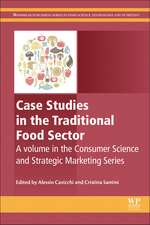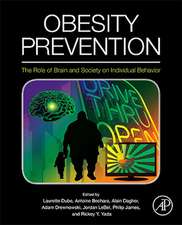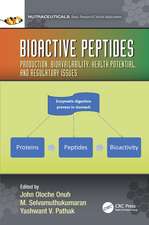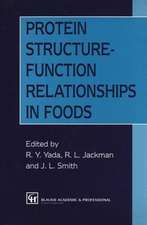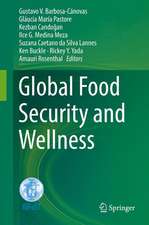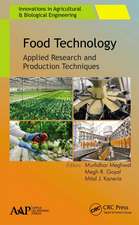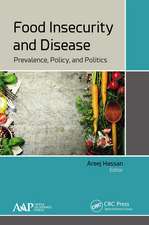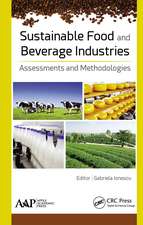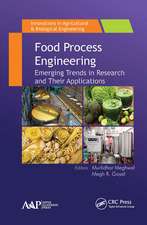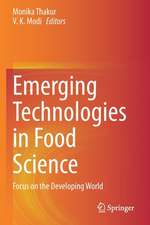Improving and Tailoring Enzymes for Food Quality and Functionality: Woodhead Publishing Series in Food Science, Technology and Nutrition
Editat de Rickey Y. Yadaen Limba Engleză Hardback – 26 iul 2015
The book explores new techniques in the production, engineering, and application of enzymes, covering sourcing, isolation, and production of enzymes for food applications. In addition, chapters include detailed discussions of enzyme processing, analytical and diagnostic applications of enzymes in the food industry, and enzyme applications in specific food commodities.
- Provides readers with the latest information on enzymes and their unique applications in the food industry
- Explores new techniques in the production, engineering, and application of enzymes, covering sourcing, isolation, and production of enzymes for food applications
- Chapters include detailed discussions of enzyme processing, engineering and analytical and diagnostic applications of enzymes in the food industry, and enzyme applications in specific food commodities
Din seria Woodhead Publishing Series in Food Science, Technology and Nutrition
- 15%
 Preț: 391.19 lei
Preț: 391.19 lei - 18%
 Preț: 975.47 lei
Preț: 975.47 lei - 24%
 Preț: 1210.03 lei
Preț: 1210.03 lei - 24%
 Preț: 946.43 lei
Preț: 946.43 lei - 9%
 Preț: 1205.99 lei
Preț: 1205.99 lei - 24%
 Preț: 1189.10 lei
Preț: 1189.10 lei - 9%
 Preț: 984.09 lei
Preț: 984.09 lei - 9%
 Preț: 1006.66 lei
Preț: 1006.66 lei - 24%
 Preț: 960.56 lei
Preț: 960.56 lei - 23%
 Preț: 1419.50 lei
Preț: 1419.50 lei - 9%
 Preț: 1206.85 lei
Preț: 1206.85 lei - 9%
 Preț: 922.07 lei
Preț: 922.07 lei - 24%
 Preț: 1192.22 lei
Preț: 1192.22 lei - 9%
 Preț: 1215.75 lei
Preț: 1215.75 lei - 24%
 Preț: 1162.37 lei
Preț: 1162.37 lei - 9%
 Preț: 950.09 lei
Preț: 950.09 lei - 24%
 Preț: 1162.62 lei
Preț: 1162.62 lei - 24%
 Preț: 801.31 lei
Preț: 801.31 lei - 27%
 Preț: 379.84 lei
Preț: 379.84 lei - 29%
 Preț: 1336.07 lei
Preț: 1336.07 lei - 24%
 Preț: 798.74 lei
Preț: 798.74 lei - 9%
 Preț: 1018.93 lei
Preț: 1018.93 lei - 24%
 Preț: 1333.02 lei
Preț: 1333.02 lei - 24%
 Preț: 1081.43 lei
Preț: 1081.43 lei - 24%
 Preț: 1185.22 lei
Preț: 1185.22 lei - 31%
 Preț: 922.77 lei
Preț: 922.77 lei - 24%
 Preț: 1131.77 lei
Preț: 1131.77 lei - 23%
 Preț: 1635.83 lei
Preț: 1635.83 lei - 9%
 Preț: 1277.62 lei
Preț: 1277.62 lei - 24%
 Preț: 1049.04 lei
Preț: 1049.04 lei - 24%
 Preț: 1134.60 lei
Preț: 1134.60 lei - 9%
 Preț: 1076.36 lei
Preț: 1076.36 lei - 24%
 Preț: 1158.21 lei
Preț: 1158.21 lei - 9%
 Preț: 1065.06 lei
Preț: 1065.06 lei - 9%
 Preț: 1067.39 lei
Preț: 1067.39 lei - 24%
 Preț: 812.03 lei
Preț: 812.03 lei - 23%
 Preț: 1237.19 lei
Preț: 1237.19 lei - 24%
 Preț: 948.79 lei
Preț: 948.79 lei - 23%
 Preț: 1138.06 lei
Preț: 1138.06 lei - 9%
 Preț: 868.43 lei
Preț: 868.43 lei - 24%
 Preț: 871.98 lei
Preț: 871.98 lei - 20%
 Preț: 1272.59 lei
Preț: 1272.59 lei - 29%
 Preț: 1195.06 lei
Preț: 1195.06 lei - 9%
 Preț: 1045.58 lei
Preț: 1045.58 lei - 9%
 Preț: 1002.45 lei
Preț: 1002.45 lei - 9%
 Preț: 505.72 lei
Preț: 505.72 lei - 9%
 Preț: 1062.13 lei
Preț: 1062.13 lei - 24%
 Preț: 1306.94 lei
Preț: 1306.94 lei
Preț: 1203.13 lei
Preț vechi: 1322.12 lei
-9% Nou
Puncte Express: 1805
Preț estimativ în valută:
230.25€ • 237.54$ • 194.87£
230.25€ • 237.54$ • 194.87£
Carte tipărită la comandă
Livrare economică 26 februarie-12 martie
Preluare comenzi: 021 569.72.76
Specificații
ISBN-13: 9781782422853
ISBN-10: 1782422854
Pagini: 266
Dimensiuni: 152 x 229 x 18 mm
Greutate: 0.57 kg
Editura: ELSEVIER SCIENCE
Seria Woodhead Publishing Series in Food Science, Technology and Nutrition
ISBN-10: 1782422854
Pagini: 266
Dimensiuni: 152 x 229 x 18 mm
Greutate: 0.57 kg
Editura: ELSEVIER SCIENCE
Seria Woodhead Publishing Series in Food Science, Technology and Nutrition
Cuprins
- List of contributors
- 1: Introduction
- 1.1 Introduction
- 2: Factors affecting enzyme activity
- Abstract
- 2.1 Fundamentals of thermodynamics
- 2.2 Formation of an enzyme–substrate complex
- 2.3 General principles of chemical kinetics
- 2.4 Enzymatic catalysis
- 2.5 Enzyme kinetics
- 2.6 Inhibition
- 2.7 Environmental considerations
- 2.8 An alternative view of enzyme catalysis
- Part One: Separation, Preparation and Biosynthesis of Enzyme Sources
- 3: Traditional enzyme separation and preparation
- Abstract
- 3.1 A brief history of enzymes
- 3.2 The sources
- 3.3 Enzyme preparation techniques: crude sample preparation
- 3.4 Enzyme preparation techniques: purification from crude preparations
- 3.5 Last words
- 4: Microbial biosynthesis of enzymes for food applications
- Abstract
- 4.1 Introduction
- 4.2 Production of microbial enzymes for food applications
- 4.3 Intrinsic and extrinsic factors influencing the microbial biosynthesis of enzymes
- 4.4 Applications of microbial enzymes
- 4.5 Final remarks
- 3: Traditional enzyme separation and preparation
- Part Two: Enzyme Processing, Packaging, Analysis, and Valorization
- 5: Current and future uses of enzymes in food processing
- Abstract
- 5.1 Introduction
- 5.2 Methods of producing enzymes
- 5.3 Biotechnological methods
- 5.4 Enzymes in food processing
- 5.5 Artificial enzymes
- 5.6 Concluding remarks
- 6: Enzymes for food waste remediation and valorisation
- Abstract
- 6.1 Introduction
- 6.2 Food waste: sources and values
- 6.3 Bioremediation of wastewater
- 6.4 Waste valorisation
- 6.5 Perspectives and conclusions
- 7: Detection of pesticides in foods by enzymatic biosensors
- Abstract
- 7.1 Introduction
- 7.2 Enzymatic biosensors for signal generation
- 7.3 Transducers for signal conversion
- 7.4 Parameters affecting biosensor performance
- 7.5 Conclusion
- 8: Enzymes for food-packaging applications
- Abstract
- 8.1 Overview: basic concepts of packaging and shelf life
- 8.2 Active and intelligent packaging: key concepts
- 8.3 Carrier systems for enzymes
- 8.4 Enzyme-enabled active packaging
- 8.5 Enzyme-enabled intelligent packaging
- 8.6 Conclusion
- 5: Current and future uses of enzymes in food processing
- Part Three: Applications of Enzymes in Foods
- 9: Enzymes in breadmaking
- Abstract
- 9.1 Introduction
- 9.2 Plant-derived enzyme systems
- 9.3 Microbial and fungal enzymes
- 9.4 Future trends
- 9.5 Further information
- 10: Enzymes in meat and fish
- Abstract
- 10.1 Introduction
- 10.2 Major classes of endogenous enzymes in muscle foods
- 10.3 Major enzymatic postmortem changes in muscle foods
- 10.4 Main roles of enzymes in the quality and safety of meat and fish
- 10.5 Enzymes involved in restructured meat and fish
- 10.6 Effects of processing on enzyme activity
- 11: Enzyme engineering (immobilization) for food applications
- Abstract
- 11.1 Introduction
- 11.2 Immobilization technologies
- 11.3 Reactive groups and immobilization carriers
- 11.4 Applications and scope of enzyme immobilization
- 11.5 Recent advances and emerging trends in enzyme immobilization
- 11.6 Conclusions
- 9: Enzymes in breadmaking
- Index




